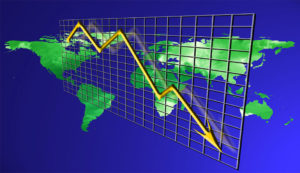
Sixty-six percent of Africa’s Chief Executive Officers (CEOs) are betting there will be no improvement in the next 12 months as the global economic slowdown weighs, according to a recent survey by consulting firm, PriceWaterhouse Coopers.
The negative outlook is spurred by rising cost of doing business, unclear and inconsistent policies, exchange rate volatility and falling consumer spend.
“CEOs should expect a tough 2017 ahead, as more pressure mounts on consumer spending and the cost of doing business,” said Bismarck Rewane, an economist and CEO of Financial Derivatives Company (FDC), at a recent conference.
Rewane also observed that firms have had no scope to pass on higher production costs to consumers, making it ever so difficult to shore up sinking profit.
“The only hope for CEOs is to ramp up efforts to seek greater internal efficiencies,” he added.
The twin effect of low business volumes, FX shortages and spiralling inflation was always going to cause a stir for Nigerian companies.
Other CEOS say concerted efforts at boosting the competitiveness of their products are on-going as the year runs out.
“Capital is moving across the whole world and local firms will have to compete with global companies and against global standards,” said Larry Ettah, group managing director of UAC, Nigeria. “In terms of our growth strategy and prospects, this means the landscape of business is going to be much more competitive.”
Ettah said the changing landscape has made UAC have a different view about growth, capital sourcing and technology.
“We are also looking at how we structure business partnerships so that they bring best practices into our own business,” Ettah added.
Other business leaders say they are restructuring their products and services to target the low end consumer segment, as consumers look away from their premium products.
Segun Ogunsanya, CEO of Airtel Nigeria says his company will create various products to fit divergent consumer wallets.
“When things are tough, you respond by restructuring,” said Dharnesh Gordhon, CEO of Nestle Nigeria, at a recent conference in Lagos. “Consumers now seek options that deliver more value for their money. In the food segment, the middle class is disappearing and our premium end products have been challenged.”
Nigerian corporates are also seen falling over one another to restructure their debt profile, according to BusinessDay findings.
“I’m not at liberty to mention names, but I’m working with a number of firms currently to restructure debt obligations,” said Emeka Ilomechina, business recovery manager at PriceWaterhouseCoopers in response to questions.
“And I can say for certain that many more will be seeking to review their debt obligations, particularly because a good number of them are experiencing liquidity challenges.”
Seven Energy, an integrated gas company in the south eastern part of Nigeria, yesterday, disclosed plans of restructuring its corporate debt.
There is no existing data on the specific number of companies that have turned to debt restructuring this year.
The International Monetary Fund (IMF) forecasts Nigeria’s economy will only expand by 0.6 percent, the lowest in over a decade.
This comes after the fund expects the economy to contract by 1.7 percent by the end of 2016.
Analysts say firms mostly in manufacturing will struggle to maintain margins as inflation and dollar shortages weigh on growth outlook.
“It is going to affect them from revenue, input costs and operating expenses,” said Tajudeen Ibrahim, head of research at Chapel Hill Denham Limited, in an emailed note to BusinessDay.
“Those that import the bulk of their raw materials will bear the brunt, as they will be hit by dollar scarcity. Rising inflation will further dampen consumer spending power as they will have to reassess their spending,” said Ibrahim.
The cumulative cost of sales of 11 companies in the beverages and consumer goods industry will rise by 52.23 percent to N1.18 trillion in the December 2016 from N775.13 billion recorded last year, according to data gathered by BusinessDay.
Nigeria’s economy declined by -0.36 and -2.06 percent (year-on-year) in the first and second quarters of 2016 respectively.